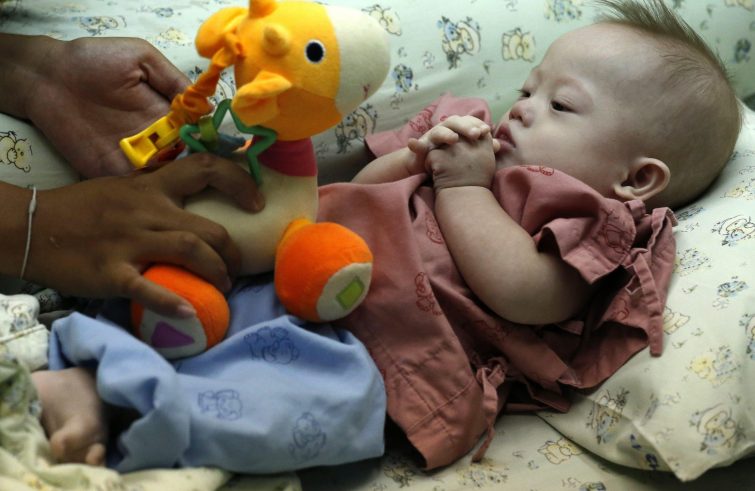
Gestational surrogacy, that is, the “sale of children. A despicable practice”, in the words of Emanuela Lulli, gynaecologist and general practitioner in Pesaro. After a two-week postponement and the rejection by the Chamber of Deputies of the request for a preliminary ruling on the constitutionality of the bill that would make surrogacy a “universal crime” and extend its prosecution to the case of recourse to this practice abroad, even in countries where GPA is legal, the text is up for debate in the Chamber of Deputies on Wednesday.
Dr. Lulli, the issue of the deep (and intimate) biological – not just emotional and psychological – bond between surrogate mother and child appears to be strikingly absent from the current debate. Do you agree?
Yes.
This bond has a very specific biological foundation, and yet it is an issue that has been shrouded in a deafening silence.
The deep ’emotional’ bond between an embryo and the woman who carries it from the first moment has been proven by decades of scientific research. Psychological studies show that emotional channels are activated particularly during the first three months of intrauterine life, and from a gynaecological point of view, the so-called ‘fetomaternal cell traffic’ takes place during the nine months of pregnancy.
The embryo, and then the foetus, produces totipotent cells which it passes on to the mother and which remain in the mother’s body for the rest of her life.
These cells, a sort of ‘gift’ from the child to the mother, are deposited along the child’s medullary canal as a sort of ‘first aid’ in case the mother’s organs are attacked by disease, even many years later. In the USA, we have seen cases of totipotent embryonic stem cells isolating a tumour in the mother’s thyroid and liver. When we studied this ‘protective shield’, we discovered that the DNA of its constituent cells was different from that of the mother. In one case, it was that of a previously aborted male foetus.
In other words, there is a real ‘dialogue’ between the child and the mother from the moment of conception?
Yes. It is a dialogue that is primarily ‘chemical’ in the pre-implantation phase of the embryo and as it travels down the fallopian tube into the uterus, and then it is a continuous molecular dialogue.
This close biological link is an undeniable scientific fact that cannot be ignored, but it is not talked about.
The reason for this lack of reflection on life in Italy is incomprehensible. But there is another aspect that needs to be explored.
What is it?
The psychological impact of surrogacy on the surrogate mother. Research has been carried out for years on the psychological effects of voluntary abortion on women who have practised it; now we should also begin to study the effects of surrogacy on the gestational carriers in the short and long term.
The mother is aware that she will be separated from her child at birth, that she will be stripped of her baby; the newborn baby will be deprived of all physical contact with the woman who carried him for nine months. An agonising tear for both?
Certainly, but especially for the mother. Children’s adaptive capacity, especially a newborn, is much greater than that of an adult, and so is the capacity to recover, albeit with great effort in some cases. My concern as a woman, a mother and a gynaecologist is precisely the possibility of emotional storms in surrogate mothers. This is an aspect that science should have the honesty to look into.
These women are not only bombarded with hormone therapy, they are also psychologically abused.
These issues need to be addressed. From a medical point of view, they are patients in their own right who need to be looked after and treated holistically.
There is an attempt to legalise ‘solidarity’ surrogacy through an opposition amendment to the bill. Can there be such an approach based on solidarity?
Solidarity implies the good of the other; what is that good if the lives of the two main parties are destroyed? Surrogacy is a form of selfishness. I have the feeling that words are being used to suit the purpose. In medicine, certain organ donations are inevitably subject to restrictions: it is not permitted to do everything that is technically possible. This is all the more reason why we cannot speak of an act of solidarity when a patient’s life is not even in danger. In medicine, there is such a thing as ‘Samaritan donation’, which refers, for example, to a kidney donation from father to son, but the action of one at the expense of the other is unacceptable. And surrogacy is a real medical intervention.
Could the law, enthusiastically welcomed by much of the feminist world, act as an effective deterrent? Or would it be better to fight a cultural battle?
These are two different levels, but one does not exclude the other. This law, which deals with a bioethically sensitive issue, could be a means to engage in educational and cultural activity. Not only to reflect on this abhorrent practice, but also to reflect on the value of motherhood, parenthood and life in general, starting from conception.
We have broken the most sacred bond in human history, the bond between mother and child, the most sacred life-giving bond.
There must be a re-beginning.












